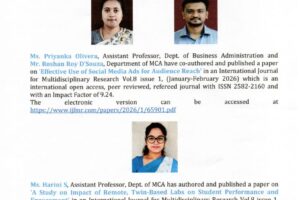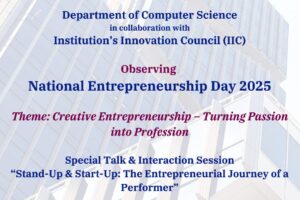
Seminar on “Cyber Crime Awareness and Hacking Exposed”

Introduction
On October 29, 2024, St. Philomena’s College, Mysore, conducted a one-day seminar titled “Cyber Crime Awareness and Hacking Exposed.” The event was organized by the Departments of BCA, B.Sc CS, and BBA in collaboration with the Internal Quality Assurance Cell (IQAC) of the college. The seminar aimed to raise awareness about the increasing prevalence of cyber crimes and hacking techniques among students, equipping them with knowledge and tools to navigate the digital landscape safely.
Program Schedule
The program commenced at 10:20 AM, hosted by MC Keerthi Hazel Dennis, who set a warm and inviting tone for the event. Key highlights of the program included:
- Philo’s Anthem: The seminar began with a soulful rendition of Philo’s Anthem, fostering a sense of community and belonging among the attendees.
- Prayer Song: A heartfelt prayer song performed by Joshua and Catherine invoked blessings for a successful seminar.
- Inauguration and Water Sapling Ceremony: At 10:27 AM, the inauguration of the seminar was marked by a symbolic water sapling ceremony, emphasizing the importance of environmental consciousness alongside technological awareness.
Dignitaries Present

The event was graced by esteemed dignitaries, including:
- Rev. Dr.Lourdu Prasad – Rector and Manager
- Rev. Fr. Gnana Pragasam – Administrator
- Rev. Fr. David Sagayaraj – Assistant to the Rector
- Dr. Ravi J.D. Saldanha – Principal of St. Philomena’s College
- Mr. A. Thomson Ganaseelan – IQAC Coordinator
- Gloriya Priyadarshini – Head of the Department of Computer Science
- Ms. Sneha Raj – ACP, Mysore (Chief Guest)
- Ms. Sharmila D – Speaker
Welcome Speech
The welcome speech was delivered by Srusti, who extended a warm welcome to all the dignitaries, speakers, and attendees. She emphasized the relevance of the seminar topic in today’s digital age and encouraged students to actively participate in discussions.
Keynote Address by Ms. Sneha Raj

Ms. Sneha Raj delivered an impactful keynote address, emphasizing several critical aspects of cyber crime that affect society today. Her discussion covered the following topics:
- Cyber Crime Overview: Madam elaborated on the growing incidence of cyber crimes and the necessity of vigilance in the digital space.
- Fake Accounts and Identity Theft: Ms. Raj highlighted the dangers posed by fake accounts on social media and the risks of identity theft, urging students to be cautious about the information they share online.
- Cyber Stalking and Morphing: Madam discussed the issues of cyber stalking and morphing, stressing the need for protective measures and legal frameworks for victims.
- Illegal Hacking: Ms. Sneha Raj shed light on illegal hacking practices and the importance of ethical boundaries in technology use.
- Investment Frauds/Scams: Madam presented common investment scams, including the Digital Arrest Scam and part-time job scams, illustrating how individuals can fall prey to these fraudulent schemes.
- Cyber Slavery: Madam concluded her address by addressing the grave issue of cyber slavery and its implications for personal freedom and security.
Presentation by Ms. Sharmila D
Following Ms. Sneha Raj’s insightful session, Ms. Sharmila D took the stage to provide a comprehensive understanding of hacking and its implications. Her presentation included:
- Computer Basics and Networks: She introduced fundamental concepts of computer systems and networking.
- Linux, Kernel, and Commands: Ms. Sharmila provided insights into the Linux operating system, explaining its architecture and essential commands for aspiring ethical hackers.
- Computer Programming: She discussed the significance of programming skills in the field of cyber security and hacking.
- Port Scanning Tools: Ms. Sharmila D demonstrated various port scanning tools, explaining their usage in identifying vulnerabilities in networks.
- Ethical Hacking: She emphasized the importance of ethical hacking as a means to safeguard systems against malicious attacks.
- Case Study: To solidify the understanding of the topics discussed, Ms. Sharmila presented a case study illustrating real-world hacking scenarios and mitigation strategies.

Conclusion
The seminar concluded with a Q&A session, allowing students to engage directly with the speakers and clarify their doubts. Feedback from participants indicated that the seminar was highly informative and beneficial in enhancing their awareness of cyber crime and hacking.
This event not only equipped students with crucial knowledge about cyber safety and ethical hacking but also inspired them to remain vigilant in the ever-evolving digital landscape. The collaboration between the departments and the support from the IQAC of St. Philomena’s College played a significant role in making this seminar a success.
The college community looks forward to more such enlightening sessions in the future.



